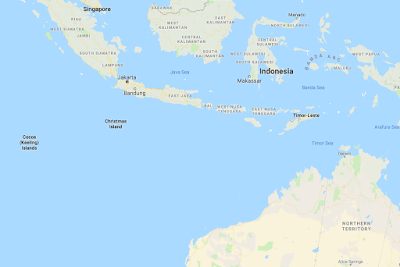Everywhere you look, there's plastic. Just glancing down at my desk I see a plastic paper clip holder, plastic mechanical pencil, plastic bases to my computer monitors. Plastic is here, there, everywhere.
I recently ready an article about a study of the remote Cocos (Keeling) Islands in the Indian Ocean. It's one of the remotest places on Earth, with a population of only 600.
 |
| Google Maps |
Marine scientists recently conducted a comprehensive survey of debris on the islands, and found a shocking amount of trash - 414 million pieces, weighing 238 tons. About 95% of the debris was plastic. Among this mess of trash were 977,000 shoes and 373,000 toothbrushes. In addition, 25% of the identifiable items were disposable plastics, such as straws, bags, and toothbrushes.
The study was published in the journal Nature and led by Dr. Jennifer Lavers of the University of Tasmania's Institute for Marine and Antarctic Studies. Dr. Lavers said remote islands that don't have large human populations to produce trash are an indicator of the amount of plastic debris circulating in the world's oceans.
“Plastic pollution is now ubiquitous in our oceans, and remote islands are an ideal place to get an objective view of the volume of plastic debris now circling the globe,” Lavers said.
Co-author Dr. Annett Finger from Victoria University noted, “As a result of the growth in single-use consumer plastics, it’s estimated there are now 5.25 trillion pieces of ocean plastic debris."
That's staggering. We're addicted to plastic, and the long term ramifications of this addiction on the environment are dire.
Dr. Finger says that “The scale of the problem means cleaning up our oceans is currently not possible, and cleaning beaches once they are polluted with plastic is time consuming, costly, and needs to be regularly repeated as thousands of new pieces of plastic wash up each day. The only viable solution is to reduce plastic production and consumption while improving waste management to stop this material entering our oceans in the first place.”
The statement that cleaning up our oceans isn't possible is frightening. It's time for all of us to act now. Start by:
- Unless necessary due to disability, skip the plastic straw. Invest in a stainless steel or other reusable straw.
- Skip the plastic bag. Bring your own shopping tote to the grocery store, and switch to reusable produce bags or skip the bag all together. (be sure to wash your bags often!)
- Look for ways to avoid buying products with plastic packaging - which is difficult. Buy in bulk whenever possible using a reusable bag/container.
- Pack your lunch in reusable containers or bags instead of disposable plastics.
- When stopping at your favorite coffee shop, bring your own insulated mug and skip the disposable cup.
- Use a refillable water bottle instead of buying plastic bottles.
- Bring your own containers for take-out food and restaurant leftovers. It may feel awkward, but many restaurants use styrofoam to package these foods.
- Ditch soda, juice, and other plastic-bottled beverages. It's better for your health and you won't use the extra plastic.
- Use natural cleaning cloths/scrubbers instead of plastic scrubbers and synthetic sponges.
As with any change, it takes all of us to do our part. As zero-waste chef Anne Marie Bonneau said, "We don't need a handful of people doing zero waste perfectly, we need millions of people doing it imperfectly."
Get started!


No comments:
Post a Comment